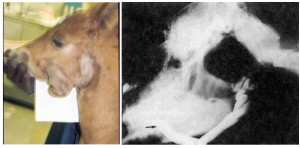Equine Oral, Esophageal and Rectal disorders
Salivary disorders
Salivary Gland Lacerations
Lacerations may heal completely, may lead to obstruction of the duct or may lead to fistula formation. Many injuries heal without complication if the are is kept clean and dry. Superglue may help to prevent leakage and allow healing.
Salivary fistula
Salivary fistula most often occurs secondary to direct injury to the parotid duct. Debridement and closure of the fistula can be successful. In resistant cases, the gland may be destroyed.
Salivary gland destruction
Inject 35-50 ml of 2% iodine or 10% formalin (best) into duct.. The distal aspect of the duct needs to be blocked so the formalin goes into gland instead of leaking out or going into the oral cavity. The injection can be repeated if required. The horse should be given NSAIDs pre and post injection.
Schmotzer WB, Hultgren BD, Huber MJ et al. Chemical involution of the equine parotid salivary gland. Vet Surg 20:128, 1991
Sialoliths
Salivary stones create a swelling in the parotid duct due to obstruction. Surgery involves an incision over the stone through the buccal mucosa The incision is left to heal by second intention.
Salivary gland neoplasia
The most common tumor is parotid melanoma. These cannot be removed but can be present for years without clinical disease.
Cysts
Mucoceles, ranula, salivary cysts, and duct atresia are rare in horses. These are treated by surgical removal, drainage of the cyst into the oral cavity or gland destruction. Diagnosis is aided by electrolyte measurement – saliva had higher potassium and calcium levels than plasma.
Salivary duct atresia
This baby had no duct opening. The gland was destroyed with 10% formalin injection. Formalin is more effective with less inflammation than 2% iodine.

Resources
Sialolithiasis in equids, a report on 21 cases, EVE 2006, Vol.18(6), pp.333-336
A review of five cases of parotid melanoma in the horse. EVE 2001 Vol 13(1), pp. 17-24.

